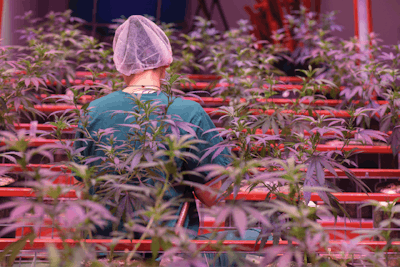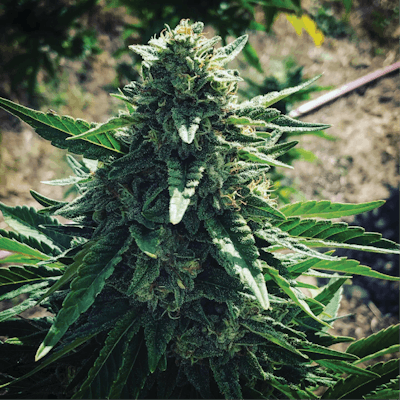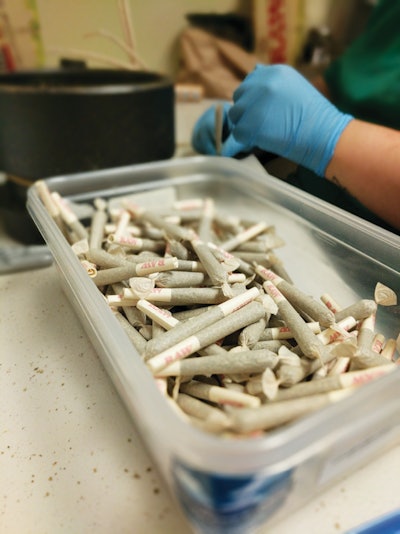
When Danielle Rosellison learned that two employees working in the trim room at Trail Blazin’ were taking premium buds from the tops of plants and hiding them in their gloves, she took swift action and terminated them.
“In this business, we’re always thinking about how to mitigate risk,” says Rosellison, CEO of Trail Blazin’, a producer-processor in Bellingham, Wash. “Theft—both internal and external theft—is one of those risks.”
Scant data exists on how often growers and dispensaries are victims of crimes—and even less is known about how often employees are the perpetrators—but there is no question that the high-value, easy-to-sell product is vulnerable to theft.
To complicate matters, traditional risk mitigation strategies, such as insurance, might not offer protection. While cannabis cultivators face multiple risks in their operations, including employee theft, insurance companies exclude coverage for losses from criminal conduct and illegal activities, according to a 2019 report from Finance Markets, Institutions and Instruments. In at least one case, a federal district court declared an insurance policy void because cannabis is still considered illegal at the federal level, according to the report.
The lack of available remedies for theft suggests that prevention may be the best way cultivators can protect themselves from related losses. Cannabis Business Times recently spoke with several growers and security experts who offered these nine security measures that cultivators can adopt to protect themselves against employee theft.

1. Go beyond the basics: State-mandated security regulations, such as video surveillance, are not enough to prevent internal theft, according to Barry Davidson, director of strategic engagement for 3 Sixty Secure Corp., a global security company based in Almonte, Ontario, Canada, with expertise in the cannabis industry. Davidson suggests cannabis companies first conduct a risk analysis with a security professional to determine which technologies are appropriate for their operations. A combination of systems, including access control, motion sensors and alarm monitoring, are often necessary to safeguard against various types of threats, he says. “Multiple layers of security are critical, and while a lot of these decisions come down to dollars and cents, creating a plan and investing in it now could lead to big savings down the road if it prevents even one instance of theft.”
2. Hire the right people: When it comes to hiring staff, Rosellison believes solid hiring practices are the first line of defense against internal theft. Rosellison places a premium on applicants who appear to be optimistic, dependable and hardworking over those with specific skill sets to work in Trail Blazin’s 10,000-square-foot indoor grow. Focusing on desirable personality traits creates a culture of trust and collaboration, which lessens the incentive to steal, she says.
At Sunnabis Farms in Humboldt County, Calif., CEO Wendy Kornberg conducts background checks on all prospective hires. The practice, she believes, helps filter out those who could pose a risk to her operation. “If you got arrested for weed, it doesn’t mean you won’t get the job,” she says. “But if you got arrested for armed robbery, I’m probably not going to hire you.”
3. Cultivate a strong company culture: At Legacy Nursery, a wholesale cannabis nursery in Modesto, Calif., owner Jennina Chiavetta works hard to treat employees well. She believes that fair pay, good benefits and treating workers with respect helps ensure that the staff working at the nursery feel valued. “If someone doesn’t feel like they’re being treated well, that’s when theft happens,” she says. “You want to make the work and the environment appealing enough that theft isn’t something that is constantly on their minds.”

4. Monitor, monitor, monitor: State regulations often require cameras in all areas of a cannabis operation. Davidson calls cameras “overt preventive measures” because workers know they are being watched, which lessens their motivation to skim cash or crops.
Kornberg mounts trail cameras in strategic spots outdoors to monitor Sunnabis’ farm and greenhouse. The cameras might not prevent theft but, she says, “At least we’ll know who did it.”
At Trail Blazin,’ all areas are under 24-hour surveillance. Rosellison says cameras allow her to see what’s happening in all areas of the operation—from trimming to packaging. From her office, she can see feeds from all 48 cameras on the screen.
5. Hire armed security: For Chiavetta, a solid security plan includes hiring armed guards for both her indoor and outdoor facilities. Protecting the plants from would-be thieves, she believes, is worth the investment, but protections need to be put in place to ensure the guards do not make off with the goods. “The guards know all of the security protocols,” she says. “Hiring two guards, who hopefully aren’t in cahoots, lessens the risk that one could flip.”
6. Lock it up: Kornberg knows cannabis growing on her farm and greenhouse are harder to protect than cannabis grown in a warehouse for one simple reason: Locks. You can lock up a building and install keypads on doors, but outdoor grows are more vulnerable to theft. Alarms can also be deterrents, but Davidson warns that alarming each door might be more of a problem than a solution, explaining, “There is potential for false alarms, and if you get too many, the human response will be to ignore them.”

7. Invest in a vault: Thanks to the growing number of credit unions in Washington State eager to work with cannabis businesses, the number of cash transactions is falling, according to Rosellison. In fact, Trail Blazin’ receives checks for almost 95% of its transactions—but when cash comes in, it goes straight to the bank.
California’s financial institutions aren’t so cannabis-friendly: All of the cash collected at Sunnabis Farms is stored under lock and key. “Leaving cash strewn about it just a bad idea,” Kornberg says. “No matter how trustworthy someone seems, that level of temptation might be too much.”
8. Track transportation: Both cash and cannabis are vulnerable during transport, says Clint Bryer, sales manager for Safety Vision. The Texas-based mobile surveillance company works with multiple cultivators to install cameras that record all of the happenings both inside and outside the vehicle. “Preventing employee theft is the No. 1 reason cannabis companies want the technology,” Bryer says. “When employees can see the cameras and know they’re being watched, it prevents something from happening.” When Legacy Nursery starts production in 2020, Chiavetta plans to handle all of the deliveries as a precaution against employee theft.
9. Protect your intellectual property: The hard work that goes into breeding quality genetics and bringing back classic strains has Chiavetta concerned about theft of intellectual property. All employees who work at Legacy Nursery sign both non-disclosure and non-compete agreements as part of their onboarding paperwork, and Chiavetta worked with an attorney to file trademarks, licensing agreements and patents to protect her intellectual property from ill-intentioned employees. “If you’re robbed before you make a dollar, there goes all of your planning,” she says.
The bottom line, says Davidson, is that no security measure will prevent internal theft on its own, explaining, “Technical measures [such as alarms, vaults and cameras] need to work hand-in-hand with process measures [such as strong hiring practices and standard operating procedures] to protect against theft.”





















